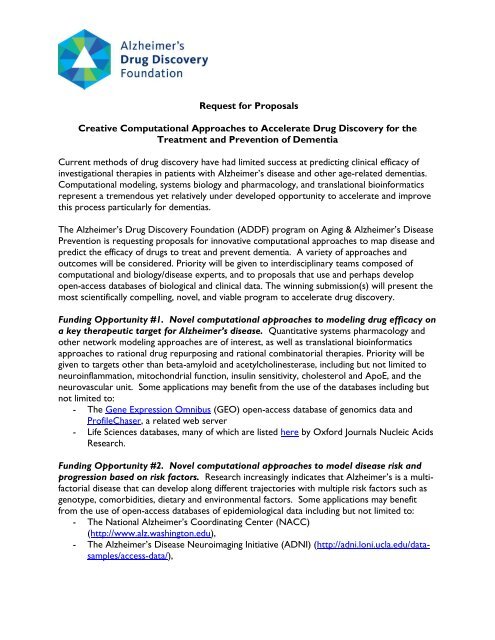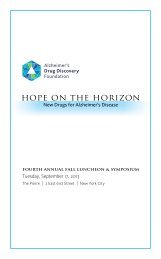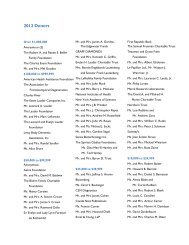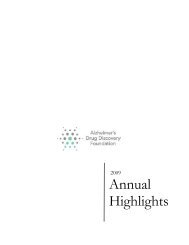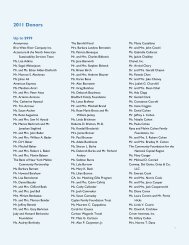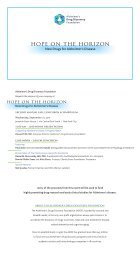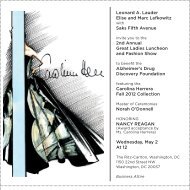Creative Computational - Alzheimer's Drug Discovery Foundation
Creative Computational - Alzheimer's Drug Discovery Foundation
Creative Computational - Alzheimer's Drug Discovery Foundation
Create successful ePaper yourself
Turn your PDF publications into a flip-book with our unique Google optimized e-Paper software.
Request for Proposals<strong>Creative</strong> <strong>Computational</strong> Approaches to Accelerate <strong>Drug</strong> <strong>Discovery</strong> for theTreatment and Prevention of DementiaCurrent methods of drug discovery have had limited success at predicting clinical efficacy ofinvestigational therapies in patients with Alzheimer’s disease and other age-related dementias.<strong>Computational</strong> modeling, systems biology and pharmacology, and translational bioinformaticsrepresent a tremendous yet relatively under developed opportunity to accelerate and improvethis process particularly for dementias.The Alzheimer’s <strong>Drug</strong> <strong>Discovery</strong> <strong>Foundation</strong> (ADDF) program on Aging & Alzheimer’s DiseasePrevention is requesting proposals for innovative computational approaches to map disease andpredict the efficacy of drugs to treat and prevent dementia. A variety of approaches andoutcomes will be considered. Priority will be given to interdisciplinary teams composed ofcomputational and biology/disease experts, and to proposals that use and perhaps developopen-access databases of biological and clinical data. The winning submission(s) will present themost scientifically compelling, novel, and viable program to accelerate drug discovery.Funding Opportunity #1. Novel computational approaches to modeling drug efficacy ona key therapeutic target for Alzheimer’s disease. Quantitative systems pharmacology andother network modeling approaches are of interest, as well as translational bioinformaticsapproaches to rational drug repurposing and rational combinatorial therapies. Priority will begiven to targets other than beta-amyloid and acetylcholinesterase, including but not limited toneuroinflammation, mitochondrial function, insulin sensitivity, cholesterol and ApoE, and theneurovascular unit. Some applications may benefit from the use of the databases including butnot limited to:- The Gene Expression Omnibus (GEO) open-access database of genomics data andProfileChaser, a related web server- Life Sciences databases, many of which are listed here by Oxford Journals Nucleic AcidsResearch.Funding Opportunity #2. Novel computational approaches to model disease risk andprogression based on risk factors. Research increasingly indicates that Alzheimer’s is a multifactorialdisease that can develop along different trajectories with multiple risk factors such asgenotype, comorbidities, dietary and environmental factors. Some applications may benefitfrom the use of open-access databases of epidemiological data including but not limited to:- The National Alzheimer’s Coordinating Center (NACC)(http://www.alz.washington.edu),- The Alzheimer’s Disease Neuroimaging Initiative (ADNI) (http://adni.loni.ucla.edu/datasamples/access-data/),
- The C-Path online Data Repository (CODR) for Alzheimer’s Disease (http://www.cpath.org/CAMDcodr.cfm).Mechanism(s) of support: Up to $150,000 in funding is available for each grant for one-yearduration, with the possibility of follow-on funding for computational or experimental research.Review Process: The deadline date for applications is September 5, 2013. Submission of aLetter of Intent (LOI) is required prior to August 22, 2013. Applications will be confidentiallyreviewed by the ADDF and an external Scientific Review Committee. The award winner(s) willbe publicly announced in Spring 2014.Application Procedure: All letters of intent and applications must be submittedelectronically at www.alzdiscovery.org. Detailed application instructions are available on thewebsite.To discuss scientific or financial aspects of proposals, please contact:Penny Dacks, Assistant Director for Aging & Alzheimer’s Disease PreventionPhone: 212-390-1392 Email: pdacks@alzdiscovery.orgFor more information regarding the application process, please contact:Reena Vanjani, Grants ManagerPhone: 212-901-8019 Email rvanjani@alzdiscovery.org


